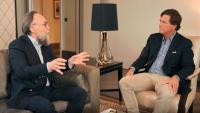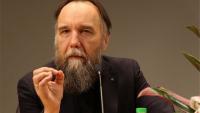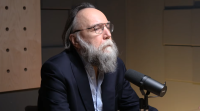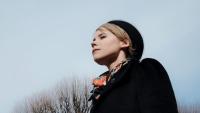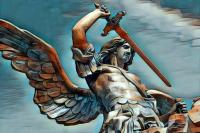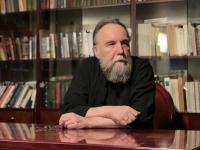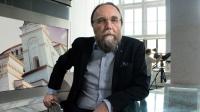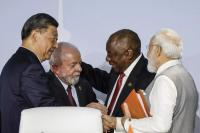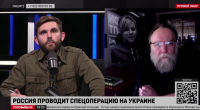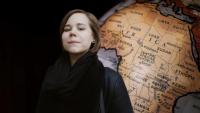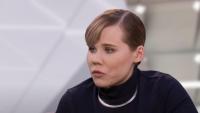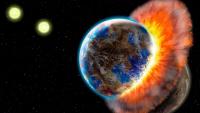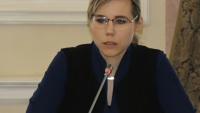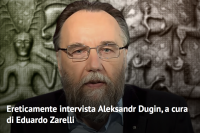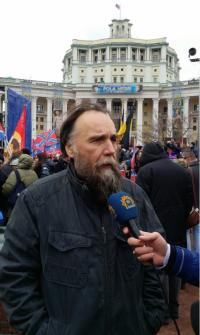Interview
The Tucker Carlson Encounter Aleksandr Dugin
Ep. 99 Aleksandr Dugin is the most famous political philosopher in Russia. His ideas are considered so dangerous, the Ukrainian government murdered his daughter and Amazon won’t sell his books.
Liberalism evil ideology
In an interview with Mehr News Agency, Alexander Dugin, the prominent Russian politician and philosopher and adviser to the Russian President Vladimir Putin discuss the developments of the Gaza war, Russia's conditions for signing the ceasefire agreement with Ukraine, and the solution to the challenges of the South Caucasus.
Exclusive interview with Alexander Dugin By Guancha.cn
Interview with Alexander Dugin, Russia's famous political thinker: Don't pay attention to what the West says about the BRICS mechanism
Q&A w/ Alexander Dugin | Multipolarity and the Decline of the West
Discussion with Professor Alexander Dugin, on the subject of Multipolarity and the Decline of the West.
Dugin: Colonialism was present at all stages of Western political thought
Interview with Russian thinker Alexander Dugin on the relationship between Western thought and colonialism and Eurocentric understandings.
Aleksandr Dugin: Is Putin's Russia Winning the Ukraine war?
As we find ourselves approaching the end of 2023, how would you define the year 2023? Today we are happy to have Professor Aleksandr Dugin, he will reveal to us the Winner of 2023 in his mind.
ALEXANDER DUGIN — EUROSIBERIA #1
Constantin von Hoffmeister talks with Alexander Dugin about the current state of Eurasianism and multipolarity, Guillaume Faye’s concept of Eurosiberia, Western racism amidst claims of universalism, the immortality of the soul as the foundation of the Fourth Political Theory, and other topics.
“We Have More Allies than It Seems”
“We Live in the Era of the End”: An Eternally Relevant Interview with Daria Dugina
For a New Middle Ages: Against Western Decadence
Moya Semya interviews Alexander Dugin
'A true intellectual, a man for whom his thoughts are more important than his physical existence': this is how they write about the Russian thinker Aleksandr Dugin, the Western press calls the philosopher 'Putin's mentor', 'the brain of the Kremlin', 'the ideological foundation of the SMO'. To destroy him, terrorists blew up Dugin's daughter Daria a year ago. What did she die for and what ideas does Dugin himself support? Interview by Marina Hakimova-Gatzemeyer.
Alexander Dugin: "Satanism is putting matter before spirit"
Global Liberalism in Crisis
The collapse of the Soviet Union in 1991 allowed liberalism to emerge as the undisputed, dominant global ideology. Over the past several years, however, the ideology’s future has come increasingly under question. Populist upheavals in the United States and Europe exposed growing discontent with the inability of liberal institutions to cope with foreign policy and economic failures. At the same time, new emerging powers such as Russia, China, and India among others have begun to put forth their own ideological alternatives.
Crisis of Global Liberalism
Alexander Dugin, one of the world’s most famous political philosophers, joins us in a new episode of our New Rules podcast
War and Geopolitics
Ο π. Βασίλειος Βολουδάκης συνομιλεί με τον καθηγητή Dr Alexandr Dugin και τον κ. Παναγιώτη Λαφαζάνη (GR/EN)
π. Βασίλειος Βολουδάκης, Παν. Λαφαζάνης - Οι ομιλίες αναρτώνται στο https://www.ypakoh.gr (Κυριακή 7/5/2023, 12:30) Επιπλέον υλικό στο κανάλι @"Εκδόσεις Υπακοή".
Philosopher Aleksandr Dugin discusses the Soviet Union’s legacy in an interview with RT
Philosopher Aleksandr Dugin discusses the Soviet Union’s legacy, multipolarity & other issues in an exclusive interview to RT.
“It's time for Paris to leave”: Africans gather in their thousands against French neo-colonialism
"Europe is the battlefield between two worldviews" - Interview with Daria Platonova
05.05.2022 - We interviewed, exclusively, Darya Platonova Dugina, philosopher graduated from Moscow State University, specialised in Neoplatonism, able political commentator and daughter of Professor Aleksandr Dugin. The interview was made originlly bilingual (italian and russian), in order to be diffused also to the Russian-speaking public.
A special military operation is a clash between two types of world order
How events in Ukraine have shaken the French political life: A FAN interview with Daria Platonova
Apportioned (distributed) Heartland
A Chinese Heartland is an altogether different question. If we recognize China as bearing the status of a Heartland, then we are emphasizing the conservative aspect of China - China as Land Power. But if China declares itself to be a Heartland against Russia, just as Hitler’s Germany declared itself to be Eurasia against Russia, then conflict will immediately arise. But in the case of an apportioned (distributed) Heartland, this acquires a completely different meaning.
Then it is possible to consider such Heartlands as a Russian Heartland, a European Heartland, a Chinese Heartland, and an Islamic Heartland (at least 3-4 empires from Turkey to Pakistan). The concept of an apportioned Heartland can be expanded to India, and projected onto Latin America and Africa as well.
Priests and Warriors should regain its essential position
To overcome the Modernity is not easy. Any alternative will be impregnated by the some modern prejudices. We need be afraid of nothing – including regress, authoritarianism and so on. We are ashamed of all such phenomena because we are still Modern. I like communitarianism. It has in itself something premodern as organic community of people living in the personalized relations to the nature and each other. But we shouldn’t exclude the imagination of Empires, hierarchies and most of all sacredness, We need to restore all three traditional types – Priest, Warrior and Peasant. The economy is the field of peasant. So the peasant community and small manufacturers are the base of the material aspect of society. But outside of Modernity the materiality is the last concern. So the real basis of the society should be the Heaven – spiritual life, sacred values. The Earth should be once more conquered by the Heaven. So the Priests and Warriors should regain its essential position. So we need reverse the Modernity that began with quite opposite with the putting the material over spiritual, the Earth over the Heaven.
Why we fight in Syria
But why does Russia provide military aid to Syria? First, this is a geopolitical conflict. The front between Atlanticists and Eurasians runs in Syria. After the collapse of the Soviet Union, a political vacuum was created in the East and in the Middle East as well. There, the U.S. pursued a project focused on destroying nation-states—dubbed the "Greater Middle East Project." It even destroyed states that had behaved more or less loyal to Washington. The U.S. creates chaos to project itself as a hegemonic power. In the 1990s, Russia was weak and did not react, but in the early 2000s, it began to recover slowly. Today, Vladimir Putin has decided to actively oppose the U.S. policy of chaos in the Middle East. Russia’s military help against terrorism in Syria can be seen as an act of Eurasian geopolitics. Syria is located at the center of the battle between the representatives of a unipolar (U.S.) and a multipolar (Russia) world order.

